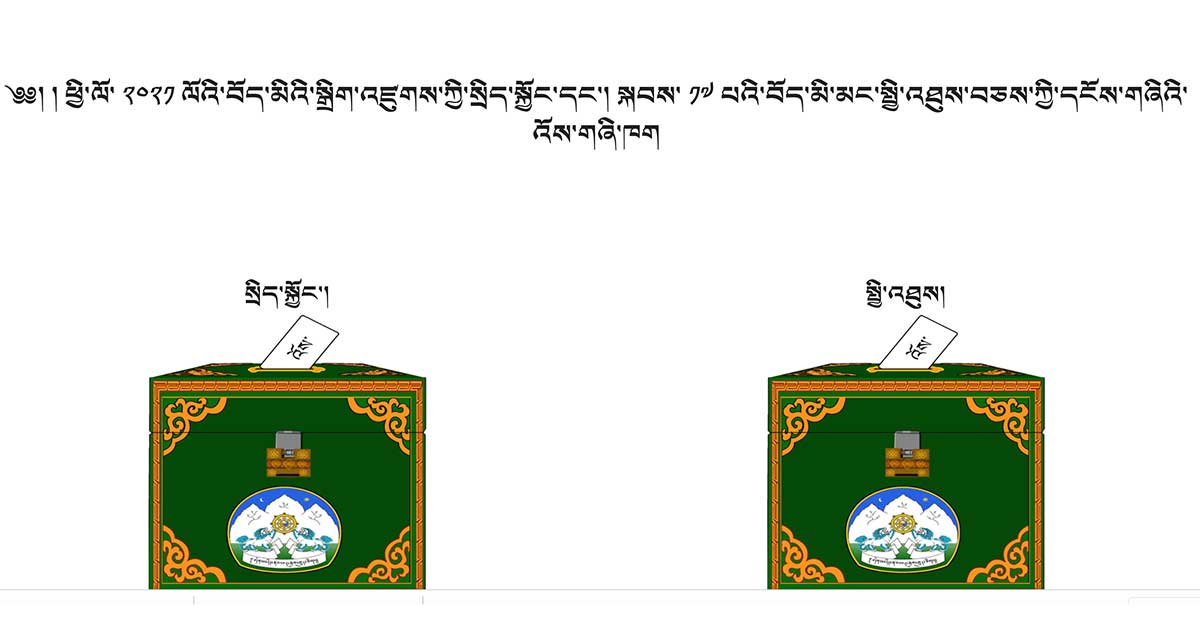
Screenshot of the Tibetan Election Commission’s web page announcing candidates for the April 11 elections.
On April 11, 2021, Tibetans in the free world will participate in the final elections to select their political leader, known as the sikyong, and 45 members of their parliament.
The candidates for the sikyong, also known as president, of the Central Tibetan Administration are Penpa Tsering and Kaydor Aukatsang. Tsering had served as a speaker of the parliament while Aukatsang had served as an advisor to the sikyong in Dharamsala, India, which is the headquarters of the CTA. Both of them have also served as representative at the Office of Tibet in Washington, DC.
The 45 newly elected members of the parliament will be from the following constituencies: 10 members each from the Indian subcontinent representing the three traditional Tibetan provinces of U-Tsang, Kham and Amdo; two members each from the four major schools of Tibetan Buddhism and the Bon religion; two members each representing Tibetans in Europe and the Americas respectively; and one member representing Australasia and other regions of Asia (excluding India, Nepal and Bhutan).
Tibetans in exile living in over 30 countries go to the polls every five years to elect both the sikyong and the members of the parliament. They have a two-stage election system, the primary one to determine candidates, followed by the main elections. The primary elections took place on Jan. 3, 2021.
Campaigning this time was comparatively subdued, partly on account of the pandemic. However, both the sikyong candidates and many of the parliamentary candidates were active with online campaigning.
The three main Tibetan language media services of Voice of America, Radio Free Asia and Voice of Tibet have been engaging with aspiring candidates in various townhall discussions and interviews. There is also a “Smartvote Tibet” initiative, which is a new online platform that invites candidates and the voters to answer a range of questions and ranks the candidates that best match the voters’ responses.
One issue that has become a matter of public debate during this election period is the controversial resolution by the parliament on March 25 to remove the three Tibetan justice commissioners connected to a disagreement over the decision to postpone a mandatory parliamentary session at the end of 2020.
The justice commission opined that this non-holding of a session was a violation of the Charter of the Tibetans in Exile, the supreme law governing the functions of the CTA, and asked for a review. When the injunction was not followed, the commission took away the voting rights of the 11 members of the parliament’s standing committee for the primary elections held in January. In response, the parliament during its most recent session in March sought recourse through the removal of the justice commissioners.
Public debate continued on the issue. Today, on April 8, parliament speaker Pema Jungney told Tibetan media that he had submitted his resignation from parliament on moral grounds. Another member of parliament who had spoken out in parliament against the justice commissioners’ action, had also resigned today on moral grounds accepting his mistakes after hearing an interview by Voice of Tibet radio with Samdhong Rinpoche, former Chairman of the Kashag (cabinet) as well as former speaker of parliament, on the issue.
Counting of the votes in the election will take place regionally in April and in Dharamsala in May, and the results announced on May 14.

